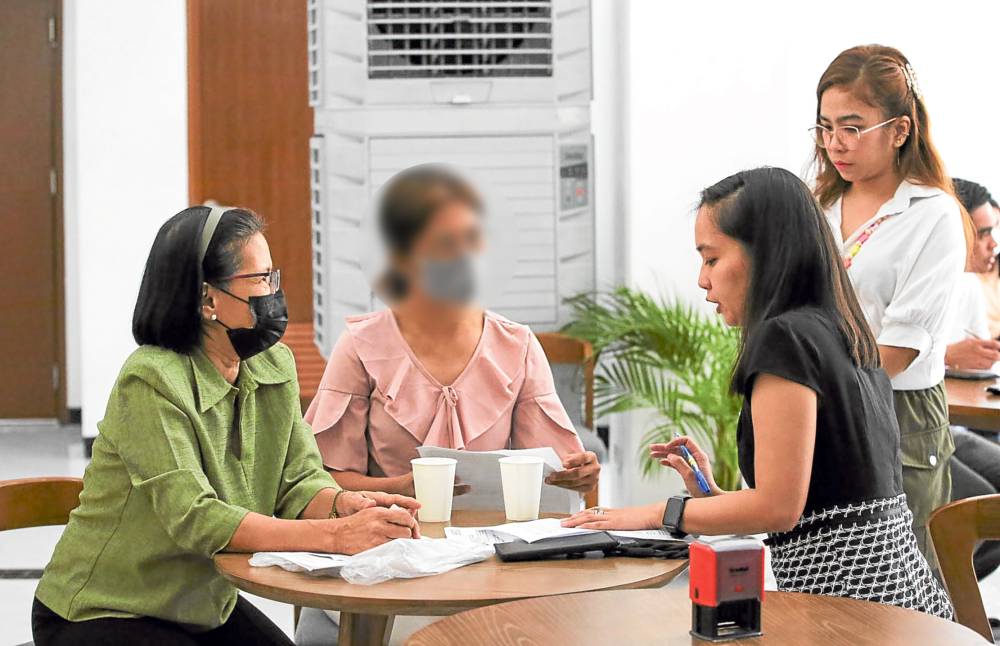
‘DEHUMANIZING INCIDENTS’ A staff from the Commission on Human Rights’ Citizens Help and Assistance Division Office interviews Gloria Almonte (left) and “Maricel” on Monday before the filing of their complaint. LYN RILLON
MANILA, Philippines — Two women whose husbands are being held at New Bilibid Prison (NBP) in Muntinlupa City filed formal complaints on Monday against its officials for allegedly subjecting them to “degrading and traumatic” strip searches, including body cavity inspections, even though they were not carrying illegal items.
The complaints were lodged before the national office of the Commission on Human Rights (CHR) in Quezon City. Fides Lim, spokesperson for Kapatid, a support group for families of political prisoners, called for an investigation, describing the searches as “outright violations of international and national laws.”
One of the complainants was Gloria Almonte, 63, the wife of political prisoner Dionisio Almonte, who said she was forced to undergo a strip search on April 21. Her husband was jailed in 2014 on charges of rebellion.
According to Gloria, she was nearly in tears and trembling” as she lifted her shirt and bra, and removed her pants and undergarments. “I was made to squat three times and then bend over while opening my private parts to check for any hidden illegal items,” she said.
READ: BJMP, CHR sign 5-year pact to improve welfare of inmates
“I felt shame during those moments … It felt like my dignity as a human being was being trampled upon,” she added.
Another complainant, the 43-year-old wife of another political prisoner, said she was made to squat naked 10 times while bending over, exposing her private parts to the prison guard conducting the strip search.
‘Tool of abuse’
“It was really traumatic and shameful to experience such things,” said the woman who asked to be identified only as “Maricel” for fear of retribution from NBP guards.
Both complainants said they were searched inside a cubicle with a female searcher of the NBP, identified only as Serrano.
Lim said that while the complainants signed waivers agreeing to the searches, these were being used as “a tool of abuse.”
“Body cavity search has become the rule rather than the exception for most [persons deprived of liberty] in violation of the United Nations Standard Minimum Rules for the Treatment of Prisoners that intrusive searches should be undertaken ‘only if absolutely necessary,’” Lim added.
Opposition lawmakers in the House of Representatives, on the other hand, called for an investigation of the “dehumanizing incidents.”
“What Gloria and Maricel experienced there in New Bilibid Prison [is] shocking and truly traumatic. This shouldn’t happen in a society that is supposedly democratic and free,” said Rep. France Castro of ACT Teachers party list group.
“So, we will try to gather all the information from all the wives of political detainees and file a House resolution to investigate this,” Castro said.
“We will also consider filing an administrative case or criminal case against these searchers. Because regardless of any orders, if this violates the law, it should not have been done,” Gabriela party list Rep. Arlene Brosas added.
According to Brosas, her group will “study how we can elevate this to Congress, have a resolution, and inform everyone, especially our [House] committee on human rights, to discuss this issue.”
Trumped-up charges
Lim told the Inquirer that strip searches have occurred before but this was the first time they were filing a complaint since most of the previous victims were afraid of retaliation. She shared that three people were supposed to file their case before the CHR but only two showed up.
Both complainants said that the charges against their husbands were “made up.”
“The person [who] was the witness for my husband’s trial was also a part of the military. They accused him [of being a member of the New People’s Army], which he is not. He is just an activist,” Almonte stressed.
In January last year, the CHR expressed “grave concern” over the strip searches being done on relatives of political prisoners at the Metro Manila District Jail Annex 4 in Camp Bagong Diwa, Bicutan City.
Its statement was based on a complaint made by Bona Fides Lucania, who said her upper undergarment was searched for contraband in a room that did not have any doors or curtains for privacy.
The CHR said that the application of the Bureau of Jail Management and Penology’s search guidelines should not be arbitrary and searches should not target kin of political prisoners.